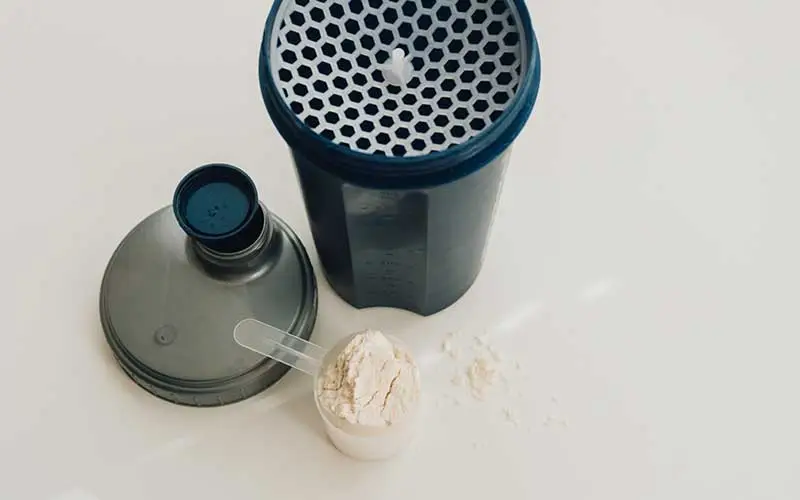Meal replacement shakes have become a quick and convenient way for those looking to consume the proper amount of daily nutrients in a fast-paced world. They promise an easy way to manage calories and ensure essential nutrients without the muss and fuss of cooking a full meal. However, as with anything, there’s also a flip side.
In this article, we’ll explore five significant concerns associated with meal replacement shakes. Plus, we’ve got some helpful tips for safely and effectively using meal replacement shakes, and we’ll tackle some of the most frequently asked questions. But, first, let’s get started by taking a deeper dive at the five most common concerns people have when adding these shakes to their diet.
#1 Digestive Issues

One of the first things that might give you pause about meal replacement shakes is their potential to mess with your digestive system. Digestive problems range from mild discomfort to serious issues, which can be a top concern for many. Here are a few factors that can lead to discomfort:
Lack of Fiber: Most meal replacement shakes lack the fiber from whole foods. Fiber is vital for proper digestion and regular bathroom trips. You might find yourself dealing with constipation or irregularity without enough of it.
Artificial Sweeteners: Some of these shakes contain artificial sweeteners like sucralose or aspartame, which don’t sit well with everyone and can cause digestive issues.
Abrupt Calorie Change: Switching from whole meals to liquid shakes can shock your digestive system. This sudden shift can lead to bloating, gas, and diarrhea.
Incomplete Nutrition: Not all meal replacement shakes are equal regarding nutrient profiles, which can mess with your gut health over time.
#2 Ingredients with Health Implications

Another issue to be mindful of when it comes to meal replacement shakes is the unhealthy additives that can be lurking in the ingredients. The main culprits being:
High Sugar Content: Some meal replacement shakes pack in added sugars, which can contribute to weight gain, insulin resistance, and other health woes.
Trans Fats: Believe it or not, some of these shakes contain trans fats, which are terrible for your heart.
Low-Quality Protein: Not all protein in these shakes are created equal. Some use low-quality sources, which are less effective in promoting muscle growth and overall health.
#3 Artificial Additives and Preservatives

Meal replacement shakes often contain artificial additives and preservatives to enhance flavor, texture, and shelf-life. While these additives are generally deemed safe by the people who regulate them, there’s still concern about the long-term side effects of meal replacement shakes on our health. The usual suspects in these shakes include:
Artificial Flavors: These chemical compounds mimic natural flavors, but might not be as harmless as one might expect.
Emulsifiers: These are used to make the texture and consistency of the shake just right. For example, carrageenan is one emulsifier that has raised concerns about its impact on gut health.
Colorants: Artificial colorants make the shake visually appealing, but some people are sensitive.
Stabilizers: Stabilizers like xanthan gum and guar gum can cause digestive discomfort in some people.
Artificial Sweeteners: We’ve mentioned them before, but it bears repeating that artificial sweeteners can lead to stomach troubles and might not be the healthiest option.
#4 Unsustainable Long-term Use

While meal replacement shakes can work wonders for short-term weight loss or as an occasional convenience, making them a long-term dietary staple can be a recipe for trouble, due to issues with:
Nutrient Deficiency: Replacing whole meals with shakes for an extended period of time can lead to nutrient deficiencies. Whole foods provide a broader spectrum of essential nutrients, and shakes may not cut it in that regard.
Monotony: Sipping on the same shake day-in and day-out can get old fast. This can make it tough to stick with for the long term.
#5 Psychological and Social Impact

Remember to consider the psychological and social impact of relying on meal replacement shakes. They’re convenient, sure, but they can also mess with your relationship with food and social interactions. Here’s a look at how meal replacements can mess with your head and your social life:
Food Obsession: The constant calorie counting and meal replacement shake obsession can lead to an unhealthy fixation on food and weight.
Social Isolation: Skipping out on regular meals with friends and family can leave you feeling isolated and excluded from social gatherings.
Disordered Eating: Over time, depending too heavily on meal replacement shakes can encourage disordered eating habits and an unhealthy food relationship.
Short-Term Focus: Shakes can create a short-term mindset focused solely on weight loss rather than long-term healthy eating habits.
Are Meal Replacement Shakes Worth Trying?
Meal replacement shakes do offer some benefits and convenience, but whether they’re worth trying depends on your goals and circumstances. Here are the potential benefits of including them in your diet:
Convenience: These shakes are quick to whip up and convenient for those with busy lives or hectic schedules.
Portion Control: Meal replacement shakes give you a precise calorie count, making portion control a breeze.
Calorie Control: When used correctly, they can help you manage your calorie intake, which is crucial for weight management.
Nutrient Intake: Some meal replacements are carefully formulated to provide a well-rounded mix of nutrients, ensuring you meet your daily vitamin and mineral requirements.
Structured Eating: For some folks, having a structured meal plan with shakes helps them stay on track with their dietary goals.
Weight Loss: Short-term meal replacement shakes can be effective for shedding pounds, especially when paired with a balanced diet and regular exercise.
Tips for Safe and Effective Use of Meal Replacement Shakes
Meal replacement shakes have gained popularity due to their convenience. However, it is important to have a handle on the pros and cons before incorporating them into your daily diet. Here are some tips to consider:
Consult a Professional: Before diving headfirst into a meal replacement shake routine, have a heart-to-heart with a healthcare professional or a registered dietitian. They can help determine whether it’s a good fit for your health and weight goals.
Pick Wisely: Choose meal replacements from trusted brands that contain quality ingredients and strong nutritional profiles.
Read Labels: Review product labels diligently to stay on top of added sugars, artificial additives, and preservatives. Opt for shakes with minimal or no unhealthy extras.
Supplement, Don’t Replace: Consider meal replacement shakes as a supplement to your regular diet, not a stand-in for whole meals.
Balance is Key: Include whole foods in your diet to guarantee a wide range of nutrients. Use shakes as a tool to round out your overall nutrition.
Stay Hydrated: Keep the water flowing throughout the day because some meal replacement shakes can dehydrate.
Mind Your Digestion: Pay attention to how your body reacts to meal replacement shakes. Consider adjusting your intake or trying a different product if you notice digestive discomfort.
Be Realistic: Meal replacement shakes aren’t a magic bullet for long-term weight management. They can be a handy supplement, but success lies in adopting healthy eating habits and a positive relationship with food for long-term success.
FAQs
What are meal replacement shakes?
Meal replacement shakes can be a convenient and nutritionally balanced alternative to full-fledged meals. Typically, they contain a mix of carbohydrates, protein, fats, vitamins, and minerals, that can help you meet your daily nutritional needs.
Can meal replacement shakes lead to nutritional deficiencies?
If you exclusively rely on meal replacement shakes for an extended period of time, you could be setting yourself up for nutritional deficiencies. Whole foods offer a broader spectrum of nutrients, so these shakes should be a supplement rather than a full meal replacement.
Can meal replacement shakes be less satisfying, leading to increased hunger?
Some people find that meal replacement shakes are less filling than regular meals, which can result in increased hunger and cravings. This can make it challenging to stick with a meal replacement shake routine over the long term.
Can meal replacement shakes be a healthy option for breakfast?
Many meal replacements are formulated to be nutritionally balanced, providing a mix of carbohydrates, proteins, fats, vitamins, and minerals. However, it’s essential to choose a high-quality breakfast replacement with minimally added sugars and artificial ingredients for a healthier option.
Final Thoughts
Meal replacement shakes can be valuable for individuals looking to manage calorie intake, save time, or kickstart a weight-loss journey. However, they do have potential drawbacks, including digestive issues, unhealthy ingredients, and psychological and social impacts.
Before adding meal replacement shakes to your diet, it’s crucial to weigh the pros and cons while considering your personal goals and circumstances. Speaking with a healthcare professional or registered dietitian can provide tailored guidance.
Always remember that meal replacement shakes are most effective when used as a supplement to a balanced diet that includes a variety of whole foods. Ultimately, the path to long-term health and well-being involves fostering healthy eating habits and cultivating a positive relationship with food.
Source
[1] Noakes, M., Foster, P. R., Keogh, J. B., & Clifton, P. M. (2004). Meal Replacements Are as Effective as Structured Weight-Loss Diets for Treating Obesity in Adults with Features of Metabolic Syndrome. The Journal of Nutrition, 134(8), 1894-1899. https://doi.org/10.1093/jn/134.8.1894
[2] Balliett, M., Rasmussen, O., & Burke, J. R. (2011). Effects of tea combined with high-protein meal replacement shakes on anthropometric measurements, lipid profiles, cellular biochemistry, neurochemistry, and microbial metabolism: A prospective observational study. Journal of Chiropractic Medicine, 10(4), 272–282. https://doi.org/10.1016%2Fj.jcm.2011.06.005
[3] Davis, L. M., Coleman, C., Kiel, J., Rampolla, J., Hutchisen, T., Ford, L., Andersen, W. S., & Hanlon-Mitola, A. (2010). Efficacy of a meal replacement diet plan compared to a food-based diet plan after a period of weight loss and weight maintenance: a randomzied controlled trial. https://doi.org/10.1186%2F1475-2891-9-11
RV Team
* Reviewology is in partnership or collaborates with top brands highlighted on this site, including those occupying the top ranking positions.
Additionally, we earn affiliate commissions from products showcased on this website when you make a purchase through the provided links on Amazon or the company website directly.
We appreciate your support using our links to purchase your favorite brands or newly discovered brands.
Latest updates
I Thought I’d Always Feel Tired, Fat, and Forgotten—Until This
310 Greens vs AG1
The Truth About 310 Greens: A No-Nonsense Review of This Popular Supplement
Popular
I Thought I’d Always Feel Tired, Fat, and Forgotten—Until This
310 Greens vs AG1
The Truth About 310 Greens: A No-Nonsense Review of This Popular Supplement
© 2024 Reviewology. All Rights Reserved.
